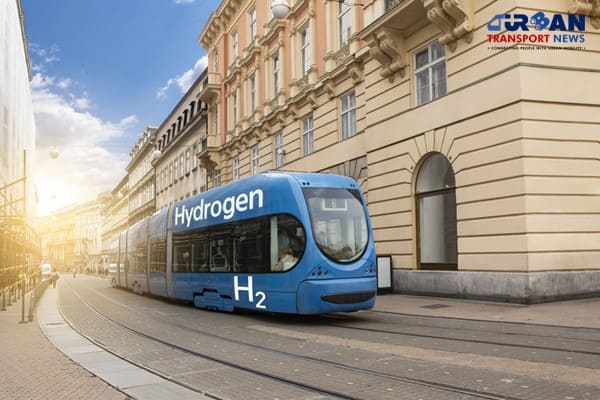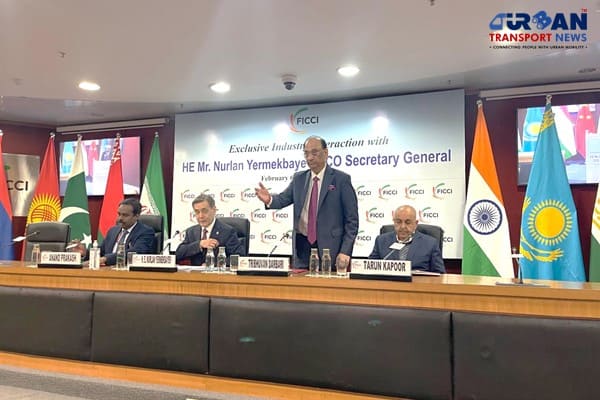 North-South Commuter Railway (NSCR): Modern Train Network Connecting Luzon Island
North-South Commuter Railway (NSCR): Modern Train Network Connecting Luzon Island India launched Bharat Taxi Service as First Cooperative-Owned Digital Mobility Platform
India launched Bharat Taxi Service as First Cooperative-Owned Digital Mobility Platform India places World’s First Live Commercial Order for Hyperloop-Based Cargo Logistics
India places World’s First Live Commercial Order for Hyperloop-Based Cargo Logistics How Weigh-in-Motion Systems Are Revolutionizing Freight Safety
How Weigh-in-Motion Systems Are Revolutionizing Freight Safety Women Powering India’s Electric Mobility Revolution
Women Powering India’s Electric Mobility Revolution Rail Chamber Launched to Strengthen India’s Global Railway Leadership
Rail Chamber Launched to Strengthen India’s Global Railway Leadership Wage and Hour Enforcement Under the Massachusetts Wage Act and Connecticut Labor Standards
Wage and Hour Enforcement Under the Massachusetts Wage Act and Connecticut Labor Standards MRT‑7: Manila’s Northern Metro Lifeline on the Horizon
MRT‑7: Manila’s Northern Metro Lifeline on the Horizon Delhi unveils ambitious Urban Mobility Vision: Luxury Metro Coaches, New Tunnels and Pod Taxi
Delhi unveils ambitious Urban Mobility Vision: Luxury Metro Coaches, New Tunnels and Pod Taxi Qatar approves Saudi Rail Link Agreement, Accelerating Gulf Railway Vision 2030
Qatar approves Saudi Rail Link Agreement, Accelerating Gulf Railway Vision 2030
European Commission Approves €6.9 Billion State Aid for Hydrogen Infrastructure

Luxembourg (Urban Transport News): In a significant move towards advancing the goals of the European Green Deal and the REPowerEU Plan, the European Commission has given its approval for a third Important Project of Common European Interest (IPCEI) known as "IPCEI Hy2Infra." This approval follows the joint proposal by seven Member States, namely France, Germany, Italy, the Netherlands, Poland, Portugal, and Slovakia.
Driving the Renewable Hydrogen Agenda
The IPCEI Hy2Infra is set to receive up to €6.9 billion in public funding, a strategic investment aimed at unlocking €5.4 billion in private investments. The primary objective of this project is to accelerate the deployment of renewable hydrogen infrastructure, ultimately reducing reliance on natural gas and aligning with the EU's ambitious climate targets.
Comprehensive Coverage Across the Hydrogen Value Chain
The IPCEI Hy2Infra spans various facets of the hydrogen value chain, providing crucial support to:
- The deployment of 3.2 GW of large-scale electrolyzers for renewable hydrogen production.
- The establishment of new and repurposed hydrogen transmission and distribution pipelines, covering approximately 2,700 km.
- The development of large-scale hydrogen storage facilities with a minimum capacity of 370 GWh.
- The construction of handling terminals and related port infrastructure for liquid organic hydrogen carriers (LOHC) capable of handling 6,000 tonnes of hydrogen annually.
This initiative is not only ambitious but also collaborative, with 32 companies, including small and medium-sized enterprises (SMEs), participating in 33 projects. The projects aim to ensure interoperability, common standards, and the prevention of barriers to facilitate future market integration.
Timeline and Regional Clusters
Anticipated developments include the operationalization of large-scale electrolyzers between 2026 and 2028, pipelines between 2027 and 2029, and the overall completion of projects by 2029. The IPCEI Hy2Infra is designed to gradually establish an EU-wide hydrogen infrastructure, starting from different regional clusters.
Building on Previous Success
This approval builds on the success of the first and second IPCEIs focused on the hydrogen value chain—Hy2Tech and Hy2Use, respectively. While the former concentrates on hydrogen technologies for end users, the latter emphasizes hydrogen applications in the industrial sector. Hy2Infra complements these efforts by addressing infrastructure investments not covered in the initial IPCEIs.
Commission's Assessment
The European Commission, following a thorough evaluation, determined that the IPCEI Hy2Infra aligns with EU State aid rules. Key considerations include:
- Contribution to common objectives of the European Green Deal, REPowerEU Plan, and EU Hydrogen Strategy.
- Ambitious nature of the 33 projects, exceeding current market offerings and paving the way for an integrated and open hydrogen network.
- Recognition of significant financial risks, justifying the need for public support.
- Limitation of aid to what is necessary and proportionate, avoiding undue competition distortions.
- Implementation of a claw-back mechanism, ensuring companies return aid if projects generate extra net revenues.
Funding, Beneficiaries, and Cooperation
The IPCEI Hy2Infra encompasses 33 projects involving 32 companies, including five SMEs. Close collaboration with external partners, such as transmission system operators, universities, and research organizations, is anticipated. Some Member States, including France, Germany, Poland, and Portugal, have included their participation in their Recovery and Resilience Plans, partially funding projects through the Recovery and Resilience Facility.
Future Prospects and European Commitment
This decision is part of broader Commission efforts to support an innovative and sustainable European hydrogen industry. It aligns with the REPowerEU plan, targeting 10 million tonnes of domestic renewable hydrogen production and imports by 2030. The European Parliament and Council's provisional agreement on updated EU rules for a hydrogen market further underscores the commitment to climate neutrality by 2050.
Executive Vice-President Margrethe Vestager emphasizes the importance of this IPCEI in establishing regional infrastructure clusters and contributing to Europe's climate-neutral aspirations. Commissioner Thierry Breton highlights the collaborative investment of over €12 billion from 32 companies, including SMEs, supporting the decarbonization of industries and job creation.
The approval of the IPCEI Hy2Infra marks a significant milestone in the European Union's journey towards a sustainable and innovative hydrogen industry. With ambitious projects, collaborative efforts, and strategic funding, this initiative sets the stage for a cleaner and more resilient future. As various Member States come together to drive renewable hydrogen development, the IPCEI Hy2Infra emerges as a crucial step towards making Europe the first climate-neutral continent by 2050.






